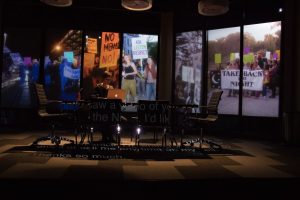STET OFFENSIVE
After watching Kim Davies’ inspired S&M play Smoke, about two young people connecting in the kitchen of a house in which a sex party is in progress, I became an instant fan. Full of lovely subtleties and ambiguities, Smoke is something to see, and if you get a chance to catch a production I recommend going. I can’t say the same of Ms. Davies’ latest effort, Stet. Inspired by events surrounding the writing and subsequent retraction of the Rolling Stone article “A Rape on Campus,†the play is a misstep. Perhaps a reason for this is that the idea did not originate with Ms. Davies; she was brought in on the project by Tony Speciale, who helms the show and is the new artistic director of the Abingdon Theatre Company. Perhaps there were too many cooks in the kitchen: while Ms. Davies is credited as the writer, the project was developed by her, Mr. Speciale, and the production’s star, Jocelyn Kuritsky, who first came up with the idea for the play. Speculations aside, Stet, though offering intelligent dialogue and a good number of sharp observations, feels flat from the start, and remains so for its entire 90 minutes.
With rape on college campuses reaching epidemic proportions, and stories of drunk female students being sexually assaulted inundating the media, magazine journalist Erika (Ms. Kuritsky) is given the assignment of writing a piece on the subject. She intends to focus her article on Ashley (Lexi Lapp), a sophomore who claims to have been gang raped as a freshman by fraternity pledges as part of their hazing ceremony. But not only is Ashley unwilling to report the attack to the police, she refuses to let Erika publish her name or the details of her assault.
Erika goes to her editor Phil (Bruce McKenzie) with an alternate proposal—to write a piece about the everyday rapes that take place in college. But Phil, though sympathetic, turns her down, on the grounds that your average middle American male reader looks on drunk girls’ claims of sexual assault with a high degree of skepticism. And it’s here that the central theme of the play is revealed: in order for a rape to get our attention, in order for us to believe and sympathize with the victim, the details of the assault must be so over-the-top horrific as to both shock and leave no room for ambiguity.
Yet the story as framed, staged on Jo Winiarski’s slick conference room set, of a reporter putting together an article, doesn’t work to explore this phenomenon. In a world of rape victims and rapists, who cares about the problems some journalist is having getting on the campus-rape-story bandwagon? Maybe if, blinded by ambition—like a drunk frat boy blinded by lust—the reporter did something controversial that mirrored the assault perpetrated on her subject, or mirrored society’s callous attitude towards rape victims, maybe then we’d find ourselves engaged. But in its desire to make all its characters sympathetic, Stet instead makes them impotent, resulting in a script that suffers from a profound lack of dramatic energy. And with tension virtually nonexistent all sorts of other impurities make their way to the surface.
Surely making Erika, as she is, the focus of the play, was simply a technical error. But it can also be viewed by those less kind as a moral failure: A work ostensibly criticizing social attitudes that contribute to rape victims being treated variously with condescension, suspicion, pity, and contempt, which then casts those victims as powerless tertiary characters with nothing to do except tell their sad tales and cry, could be said to be born of that same family of attitudes it’s supposedly condemning.
Or when a character tells the story of drinking with an acquaintance who wanted to have sex with her. She wasn’t interested but he kept buying her drinks, and the next thing she knew she woke up in his bed. And even though the woman is not certain that sex took place—she blacked out—we are meant to see this story as an example of the kind of “everyday†sexual assault that we as a society don’t like to acknowledge.
The play assumes we are on this woman’s side. And if we had seen her story played out, with its details and nuances, we probably would have been. Instead Stet is asking us to take vital information for granted, encouraging questions it’s not prepared to answer, such as: Does the fact that one cannot remember what happened during a drinking session necessarily mean that one was incapable of making more or less reasonable decisions during that session? (I can say from personal experience that it does not.) If the play is arguing that it does, which it seems to be, then another question arises: Might this “rape epidemic†be the result not so much of an increase in assaults or in their reporting, but of the broadening of the definition of rape to include regrettable sex? Surely this is not what the play intends to say. Yet that is exactly what it comes so perilously close to doing.
Additional cast members: Jack Fellows and Déa Julien.
photos by Ben Strothmann
Stet
Abingdon Theatre Company
in association with The Muse Project
June Havoc Theatre, 312 West 36th St.
ends on July 10, 2016
for tickets, visit Abingdon









